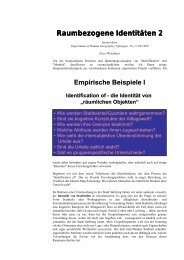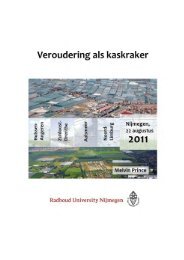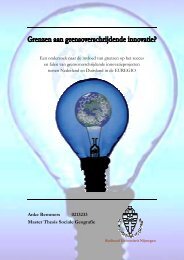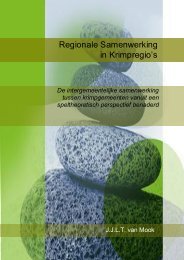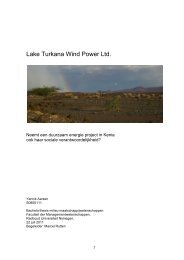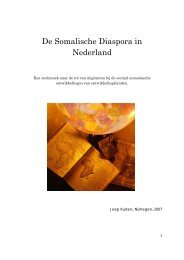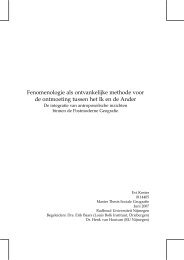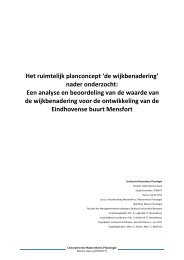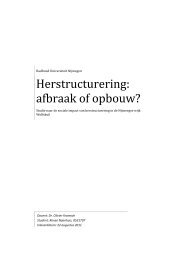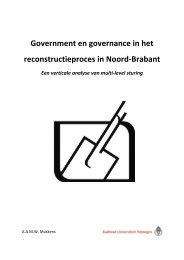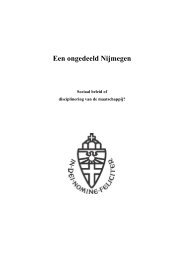Trading with the enemy in Mitrovica, Kosovo. - RUhosting
Trading with the enemy in Mitrovica, Kosovo. - RUhosting
Trading with the enemy in Mitrovica, Kosovo. - RUhosting
You also want an ePaper? Increase the reach of your titles
YUMPU automatically turns print PDFs into web optimized ePapers that Google loves.
4. Trade encourages <strong>the</strong> broader expansion of economic ties.” (Blanton, 2006)<br />
Trade has more qualities than just economics, it has cultural spillovers and leads to an exchange of ideas<br />
which can play an important role <strong>in</strong> <strong>the</strong> creation of a security community. Because of this <strong>the</strong> <strong>in</strong>fluence of<br />
trade on cooperation and conflict is much larger than just <strong>the</strong> exchange of money and goods. This means that<br />
<strong>the</strong> real <strong>in</strong>fluence of trade on (political) relations may be less shaped by trade volume and more so by <strong>the</strong><br />
<strong>in</strong>teractions and transactions that are accompanied by trade (Blanton, 2006). Blanton's results seem to<br />
confirm this, as trade was a good <strong>in</strong>dicator of economic and cultural transactions and correlated <strong>with</strong> o<strong>the</strong>r<br />
<strong>in</strong>teractions on a cultural level such as student exchanges and tourist flows. On top of that trade positively<br />
determ<strong>in</strong>ed <strong>the</strong> frequency of economic and military cooperation, and <strong>with</strong> this trade could provide a<br />
foundation for cooperation on both economic and strategic issues.<br />
When <strong>the</strong>se <strong>the</strong>ories are applied to <strong>Kosovo</strong>, a few problems arise. The Kantian peace <strong>the</strong>ory is about <strong>in</strong>terstate<br />
relations and although it's evidence makes <strong>the</strong> notion “trade br<strong>in</strong>gs peace” very believable, my research<br />
is about trade between ethnic groups, not states. In <strong>the</strong> specific case of <strong>Kosovo</strong> and <strong>Mitrovica</strong>, this is not a<br />
complete dist<strong>in</strong>ction as <strong>in</strong> some ways <strong>the</strong> relations between Albanians and Serbs <strong>in</strong> <strong>Mitrovica</strong> are more <strong>in</strong>terstate<br />
like than one might expect. First, Albanians consider <strong>the</strong> Prist<strong>in</strong>a-based Kosovar government to be <strong>the</strong><br />
legal entity <strong>in</strong> <strong>Kosovo</strong> and this is where <strong>the</strong>ir loyalties lie. The government considered legal by most Serbs<br />
liv<strong>in</strong>g <strong>in</strong> <strong>Kosovo</strong> is still <strong>the</strong>ir Serbian government <strong>in</strong> Belgrade. So, while <strong>the</strong> two ethnic groups live <strong>in</strong> <strong>the</strong><br />
same country (be it <strong>Kosovo</strong> or Serbia) <strong>the</strong>y pledge allegiance to different governments. Second and more<br />
specific for <strong>Mitrovica</strong>, <strong>the</strong>re's <strong>the</strong> territorial aspect. The jurisdiction of <strong>the</strong> Kosovar government officially<br />
(from a Kosovar perspective) ends at <strong>Kosovo</strong>'s border <strong>with</strong> Serbia, but <strong>in</strong> practise it ends at <strong>the</strong> river Ibar<br />
right <strong>in</strong> <strong>Mitrovica</strong>. The Serbs north of <strong>the</strong> river Ibar still live <strong>in</strong> an area of <strong>Kosovo</strong> where <strong>the</strong> jurisdiction of<br />
Belgrade is much stronger than that of Prist<strong>in</strong>a. When looked at it this way, it's as if both communities do<br />
live <strong>in</strong> different countries <strong>with</strong> <strong>the</strong> river Ibar <strong>in</strong> <strong>Mitrovica</strong> as its border.<br />
So <strong>the</strong>re are <strong>in</strong>ter-state factors present <strong>in</strong> <strong>the</strong> relations between Albanians and Serbs <strong>in</strong> <strong>Mitrovica</strong>, but <strong>the</strong>se<br />
are still ethnic groups and not states by <strong>the</strong>mselves. This means <strong>the</strong> Kantian Peace cannot be expected to<br />
apply directly to this case. S<strong>in</strong>ce <strong>the</strong>re has been no research so far that tried to apply <strong>the</strong> trade aspect of <strong>the</strong><br />
Kantian Peace <strong>the</strong>ory on ethnic groups, strong predictions based on scientific evidence cannot be made<br />
before <strong>the</strong> research is conducted. These predictions will be difficult to make even after <strong>the</strong> research is<br />
conducted s<strong>in</strong>ce it is based on <strong>in</strong>terviews. But this is not <strong>the</strong> goal of <strong>the</strong> this <strong>the</strong>sis. Its goal is to explore, from<br />
a practical po<strong>in</strong>t of view if <strong>in</strong>ter-ethnic trade can improve relations, and from a <strong>the</strong>oretical po<strong>in</strong>t of view to<br />
what extend <strong>the</strong> trade element from <strong>the</strong> Kantian Peace Theory can also be applied to ethnic groups. For<br />
explor<strong>in</strong>g this <strong>the</strong>oretical objective, <strong>Kosovo</strong> is a good place to start. The idea to apply <strong>the</strong> "trade br<strong>in</strong>gs<br />
peace" <strong>the</strong>ory on ethnic groups may be new and untested, but <strong>in</strong> <strong>Kosovo</strong> <strong>the</strong> difference between states and<br />
ethnic groups is less big than <strong>in</strong> many o<strong>the</strong>r conflicts so it does not trail too far from <strong>the</strong> orig<strong>in</strong>al Kantian<br />
20



